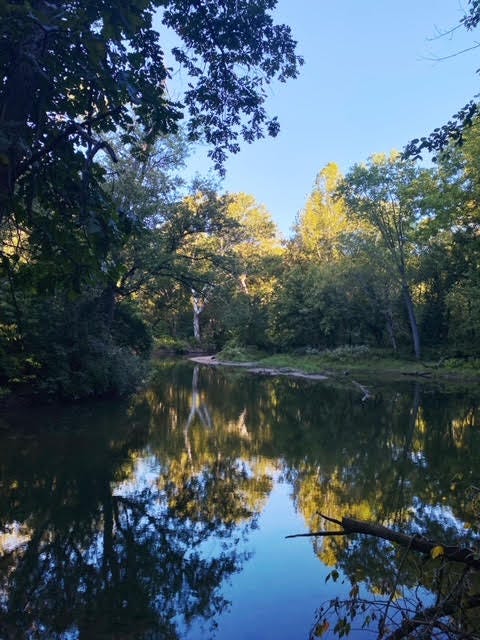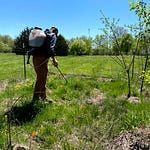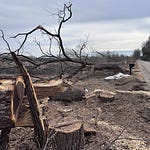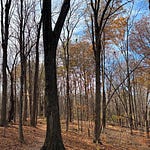This is the newsletter version of Sara by the Season, where I explore a little bit of everything that’s on my mind as I try to lean into nature’s wisdom and rhythms. You can listen to me read you the newsletter by hitting play above - or you can click the little link above and to the right to play in your favorite podcast player. If you know someone who would like this sort of thing, I’d be so grateful if you would share it!
Last week was the Fall Equinox, one of two times during the year that we celebrate the balance of the light and the dark.1 The equinoxes always have me thinking about balance. I recently read The Chalice and The Blade: Our History, Our Future by Riane Eisler, a book originally published in 1987 and one that has been on my TBR pile for a long time.
It too, in a way, is about balance. The premise of the book is that there is quite a bit of evidence that humans lived in what Eisler calls “partnership” societies for much of what we consider the prehistoric period (which, as a reminder from tenth grade world history, just means the time before humans started writing things down). Eisler’s research plots human civilizations on a continuum from partnership to dominator societies, which she describes as follows:
the dominator model is what is popularly termed either patriarchy or matriarchy—the ranking of one half of humanity over the other. The second [model], in which social relations are primarily based on the principle of linking rather than ranking, may best be described as the partnership model. In this model—beginning with the most fundamental difference in our species, between male and female—difference is not equated with either inferiority or superiority.
The thesis of The Chalice and The Blade is that we once moved from partnership models (associated with the chalice) to dominator models (associated with the blade), and because we did it once, we can and should do it again—for the well being of all life on earth. From my research, it was a controversial book back when it was originally published in 1987, but I found it no less mind-bending as I was reading it 35 years later.
One thing I’ve thought a lot about in the last few years as we’ve societally wrestled with big questions like the Me Too Movement, Black Lives Matter, indigenous rights, who gets to decide how history is taught, etc. is this idea of the need for the pendulum to swing in the other direction for a few centuries. The idea being that, for example, we’ve been living under the thumb of patriarchal systems for a few millennia, so the pendulum needs to swing far in the exact opposite direction for a few millennia so that, maybe, eventually, we could find somewhere in the middle that is less problematic.
But Eisler helped me to see that perhaps the matriarchy, which is what I thought was the opposite of the patriarchy, is just another dominator model. So maybe the pendulum swinging towards a matriarchal system would have all sorts of its own problems. Maybe this pendulum idea is another false dichotomy that doesn’t really get us where we want to go.
Instead of waiting for the pendulum to swing in the entirely opposite direction, we - and all of creation - need us to find a way together to get the pendulum’s momentum to rest somewhere more in the middle between the extremes. In Sand Talk, Tyson Yunkaporta talks about the ngak lokath, an indigenous word for the brackish water that collects during the wet season when when the fresh water from the rivers mixes with the salt water along the coast. This process, he writes,
is a phenomenon of dynamic interaction occurring when opposite forces meet in an act of new creation. It is a principle that guides the interactions of different groups and interests in society, a reflection of the natural processes of organizing systems. Changes and transformations occur this way. Dynamic systems of culture, even languages, evolve over time through these interactions.
In order for the “brackish waters of hybridity to stew up something exciting,” as Yunkaporta calls it, those of us who have historically had more power and privilege need to step back, to give more room for those who have had less power, less of a voice to step forward so that those brackish waters can properly balance out and mix together into the something exciting Yunkaporta foretells.
Maybe the visual of the pendulum helps us visualize the inequities of our collective past, but it isn’t all that great as a metaphor to imagine a new future. Instead, maybe we consider the ngak lokath as our guiding metaphor for a way forward, one in which we can all - human and more-than-human - contribute, mix, and transform into something new and beautiful.
Scattering Seeds
I’m always finding stuff that supports the thesis of the book I’m writing on the benefits of leaning into nature’s wisdom, so I thought I could start sharing those links and things here with all of you in hopes of some of the seeds I share germinating into something beautiful at your place.
An beautiful ode for those of us who love the darker days ahead: “I love the shorter days, the darkness, the cold. Even the clouds don’t bother me; I can handle multiple days of overcast better than I can those of unrelenting sun. I prefer a mix of both, of course … but if I have to choose, I thrive in gloom.”
My friend Joy is offering this upcoming course that sounds amazing for those of you curious about the divine feminine and recovering our cyclical natures.
This John O’Donohue blessing “for the interim time” has always seemed like the perfect autumn blessing to me.
Mary Oliver’s Drunk Cousin with the quintessential living seasonally poem:
Cheers to imagining new ways to mix the waters!
Sara
Side note: if the light and the dark are only “in balance” twice a year, why in the world do we keep expecting our lives to be balanced?!















Share this post